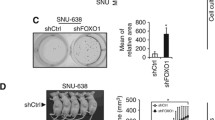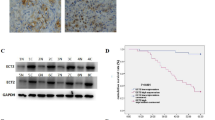Abstract
MicroRNAs are found to play an important role in gastric cancer. Reduced expression of microRNA-218 (miR-218) is of key interest. The target gene of microRNA-218, epidermal growth factor receptor-coamplified and overexpressed protein (ECOP) encoded by the VOPP1 gene, has been implicated in tumorigenesis. However, few studies on expression and function of ECOP in gastric cancer have been reported. ECOP expression was determined in matched normal and gastric adenocarcinoma tissue specimens by immunohistochemistry and western blot. Subsequently, ectopic overexpression and RNAi-mediated silencing of VOPP1 was effected in the human gastric cancer cell line, AGS. Proliferation and migration of parental, VOPP1 overexpressing and VOPP1-silenced AGS cells were evaluated by cell proliferation assay and scratch wound-healing motility assay. Finally, intracellular localization of ECOP in AGS cells was assessed by green fluorescent protein tagging and fluorescent microscopy. Western blot and immunohistochemistry showed overexpression of ECOP in gastric adenocarcinoma tissues compared to matched normal tissue specimens. Ectopic overexpression and RNAi-mediated silencing of VOPP1 promoted and inhibited, respectively, cell proliferation and migration in AGS cells. Intracellular localization of ECOP in perinuclear lysosomes mimicked colocalization earlier reported for other cancerous cells. VOPP1 is overexpressed in gastric adenocarcinoma, which is involved in promoting cell proliferation and migration and thus might serve as a putative oncogene.



Similar content being viewed by others
References
Chiba T, Marusawa H, Ushijima T. Inflammation-associated cancer development in digestive organs: mechanisms and roles for genetic and epigenetic modulation. Gastroenterology. 2012;143:550–63.
Song S, Ajani JA. The role of microRNAs in cancers of the upper gastrointestinal tract. Nat Rev Gastroenterol Hepatol. 2013;10:109–18.
Wu WK, Lee CW, Cho CH, et al. MicroRNA dysregulation in gastric cancer: a new player enters the game. Oncogene. 2010;29:5761–71.
Pan HW, Li SC, Tsai KW. MicroRNA dysregulation in gastric cancer. Curr Pharm Des. 2013;19:1273–84.
Ma YY, Tao HQ. Microribonucleic acids and gastric cancer. Cancer Sci. 2012;103:620–5.
Gigek CO, Chen ES, Calcagno DQ, et al. Epigenetic mechanisms in gastric cancer. Epigenomics. 2012;4:279–94.
Petrocca F, Visone R, Onelli MR, et al. E2F1-regulated microRNAs impair TGFbeta-dependent cell-cycle arrest and apoptosis in gastric cancer. Cancer Cell. 2008;13:272–86.
Ueda T, Volinia S, Okumura H, et al. Relation between microRNA expression and progression and prognosis of gastric cancer: a microRNA expression analysis. Lancet Oncol. 2010;11:136–46.
Fish JE, Wythe JD, Xiao T, et al. A Slit/miR-218/Robo regulatory loop is required during heart tube formation in zebrafish. Development. 2011;138:1409–19.
Tie J, Pan Y, Zhao L, et al. MiR-218 inhibits invasion and metastasis of gastric cancer by targeting the Robo1 receptor. PLoS Genet. 2010;6:e1000879.
Li BS, Zhao YL, Guo G, et al. Plasma microRNAs, miR-223, miR-21 and miR-218, as novel potential biomarkers for gastric cancer detection. PLoS ONE. 2012;7:e41629.
Gao C, Zhang Z, Liu W, et al. Reduced microRNA-218 expression is associated with high nuclear factor kappa B activation in gastric cancer. Cancer. 2010;116:41–9.
Li CH, To KF, Tong JH, et al. Enhancer of zeste homolog 2 silences microRNA-218 in human pancreatic ductal adenocarcinoma cells by inducing formation of heterochromatin. Gastroenterology. 2013;144:1086–97.
Xia H, Yan Y, Hu M, et al. MiR-218 sensitizes glioma cells to apoptosis and inhibits tumorigenicity by regulating ECOP-mediated suppression of NF-kB activity. Neuro Oncol. 2013;15:413–22.
Park S, James CD. Ecop, EGFR-coamplified and overexpressed protein, a novel protein, regulates NF-kappaB transcriptional activity and associated apoptotic response in an IkappaBalpha-dependent manner. Oncogene. 2005;24:2495–502.
Baras A, Moskaluk CA. Intracellular localization of GASP/ECOP/VOPP1. J Mol Histol. 2010;41:153–64.
Eley GD, Reiter JL, Pandita A, et al. A chromosomal region 7p11.2 transcript map: its development and application to the study of EGFR amplicons in glioblastoma. Neuro Oncol. 2002;4:86–94.
Baras AS, Solomon A, Davidson R, Moskaluk CA. Loss of VOPP1 overexpression in squamous carcinoma cells induces apoptosis through oxidative cellular injury. Lab Invest. 2011;91:1170–80.
Baras A, Yu Y, Filtz M, Kim B, Moskaluk CA. Combined genomic and gene expression microarray profiling identifies ECOP as an upregulated gene in squamous cell carcinomas independent of DNA amplification. Oncogene. 2009;28:2919–24.
Sliwkowski MX, Mellman I. Antibody therapeutics in cancer. Science. 2013;341:1192–8.
Burtness B, Bauman JE, Galloway T. Novel targets in HPV-negative head and neck cancer: overcoming resistance to EGFR inhibition. Lancet Oncol. 2013;14:e302–9.
Chu H, Wang M, Jin H, et al. EGFR 3′UTR 774T>C polymorphism contributes to bladder cancer risk. Mutagenesis. 2002;28:49–55.
Okines A, Cunningham D, Chau I. Targeting the human EGFR family in esophagogastric cancer. Nat Rev Clin Oncol. 2011;8:492–503.
Acknowledgments
We thank Dr. Zhenglin Yang (Center for Human Molecular Biology and Genetics, The Institute of Laboratory Medicine, Sichuan Academy of Medical Sciences and Sichuan Provincial People’s Hospital) and Prof. Yan Peng (Department of Gastroenterology, Luzhou Medical College) for their excellent technical assistance.
Conflict of interest
None.
Author information
Authors and Affiliations
Corresponding author
Additional information
Caiping Gao and Minghui Pang have contributed equally to this work.
Rights and permissions
About this article
Cite this article
Gao, C., Pang, M., Zhou, Z. et al. Epidermal growth factor receptor-coamplified and overexpressed protein (VOPP1) is a putative oncogene in gastric cancer. Clin Exp Med 15, 469–475 (2015). https://doi.org/10.1007/s10238-014-0320-7
Received:
Accepted:
Published:
Issue Date:
DOI: https://doi.org/10.1007/s10238-014-0320-7




